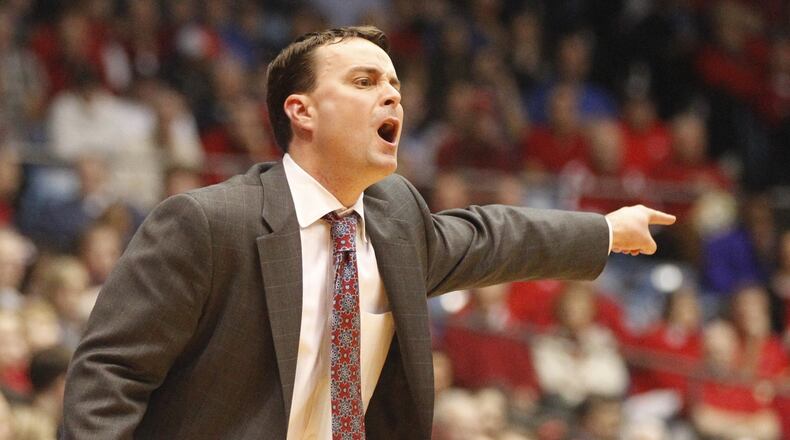“In general, for our coaches that do have contracts, we do have bonus opportunities for what I would say is high-reaching academic success of athletes in terms of both their progress and graduation success rates,” said Tim Wabler, UD Vice President and Director of Athletics.
“We also, in general, do bonuses for postseason success, in particular the NCAA tournament.”
Wabler would not discuss the amounts of bonuses for Miller, who was hired in April 2011 and this February had his contract extended through the 2018-19 season. As a private institution, UD is not required to make employee contracts public.
But according to UD’s tax-exempt IRS form covering the fiscal year ending June 30, 2012 — the most recent form available — Miller’s total compensation in 2011 was $335,152, including a $25,000 bonus for the Flyers’ strong academic performance.
NCAA documents show that Miller’s first team at UD in 2011-12 had an Academic Progress Rate that fell within the 80-90th percentile in Division I. The APR is a calculation of points assigned to each athlete for eligibility and retention and is used to determine academic-based bonuses, Wabler said.
Efforts to retain top coaches typically include increasing the value of their contracts, said Chris Conard, a UD graduate and attorney at Coolidge Wall law firm in Dayton. That means that Miller likely received a significant raise when he signed his contract extension.
“The reality is that Dayton is considered to be a mid-major team,” Conard said. “In the past, with our exception of (longtime coaches) Tom Blackburn and Don Donoher, Dayton has generally become a steppingstone for coaches to go on to larger programs.”
Wabler, also a UD graduate, said the practice of awarding bonuses is less about retaining coaches and more about rewarding successful academic and athletic performance.
“I really think what it does is reward them for outstanding work in a given season,” he said. “I think the coaches we have at UD are committed to the academic success of the students.”
Bonus payments vary by school. The Dayton Daily News reported earlier this month that Ohio State University men’s basketball coach Thad Matta received a $1.2 million bonus in 2013, and women’s basketball coach Kevin McGuff received a $1.14 million bonus.
Prior to Miller’s hiring in April 2011, UD coach Brian Gregory earned total compensation of $943,004 in 2010, more than double what UD President Daniel Curran made that year.
Gregory earned a $15,000 bonus as part of his pay, according to the 2010-11 tax return, “based on the performance of the men’s basketball team advancing to the final four of the NIT tournament.”
Gregory left for Georgia Tech in March 2011 but was paid $506,459 that year, according to the IRS form.
Miller’s perks extend beyond bonuses. Records show that the men’s basketball team “may travel via chartered flights to games to minimize the time spent away from campus for the players.”
Additionally, the spouses of UD’s president, vice president for athletics and head basketball coach may “travel to a limited number of events for business purposes each year.”
According to the university’s return, these events are taxable expenses for the employees and include “alumni events, men’s basketball conference tournaments, and the NCAA men’s basketball tournament.”
About the Author
